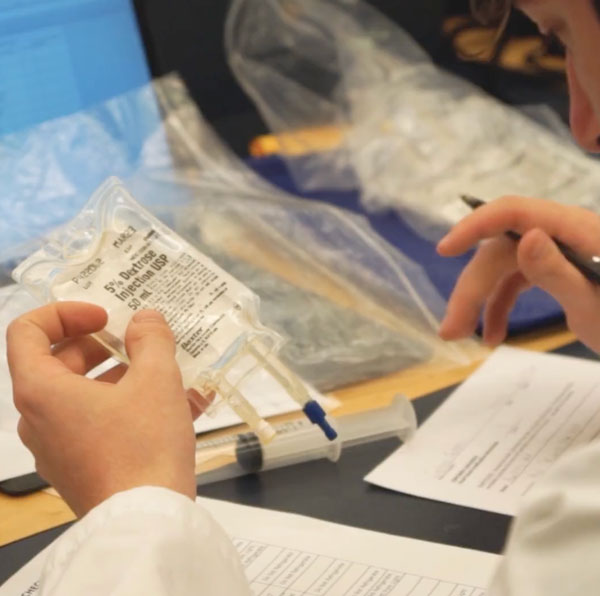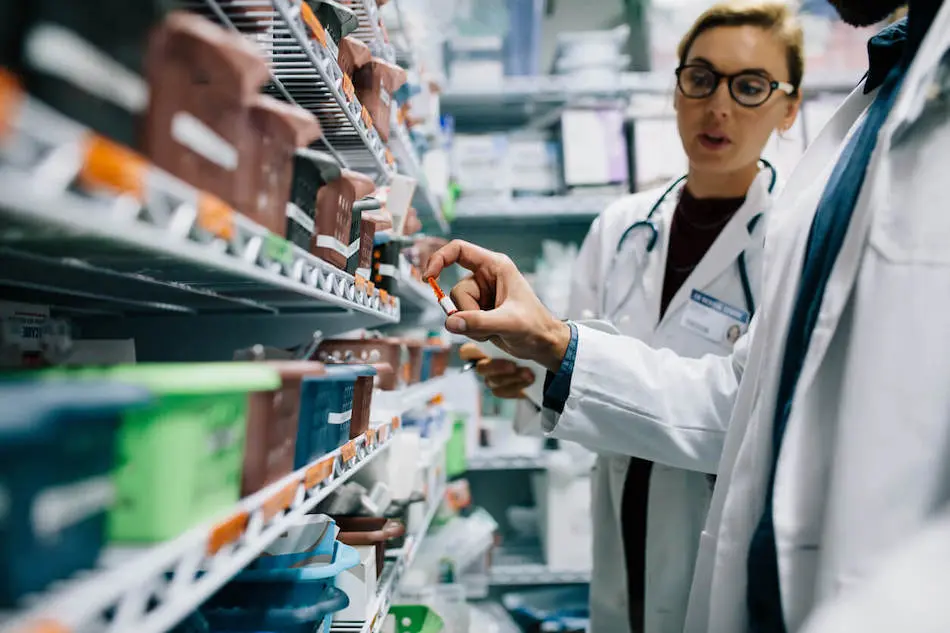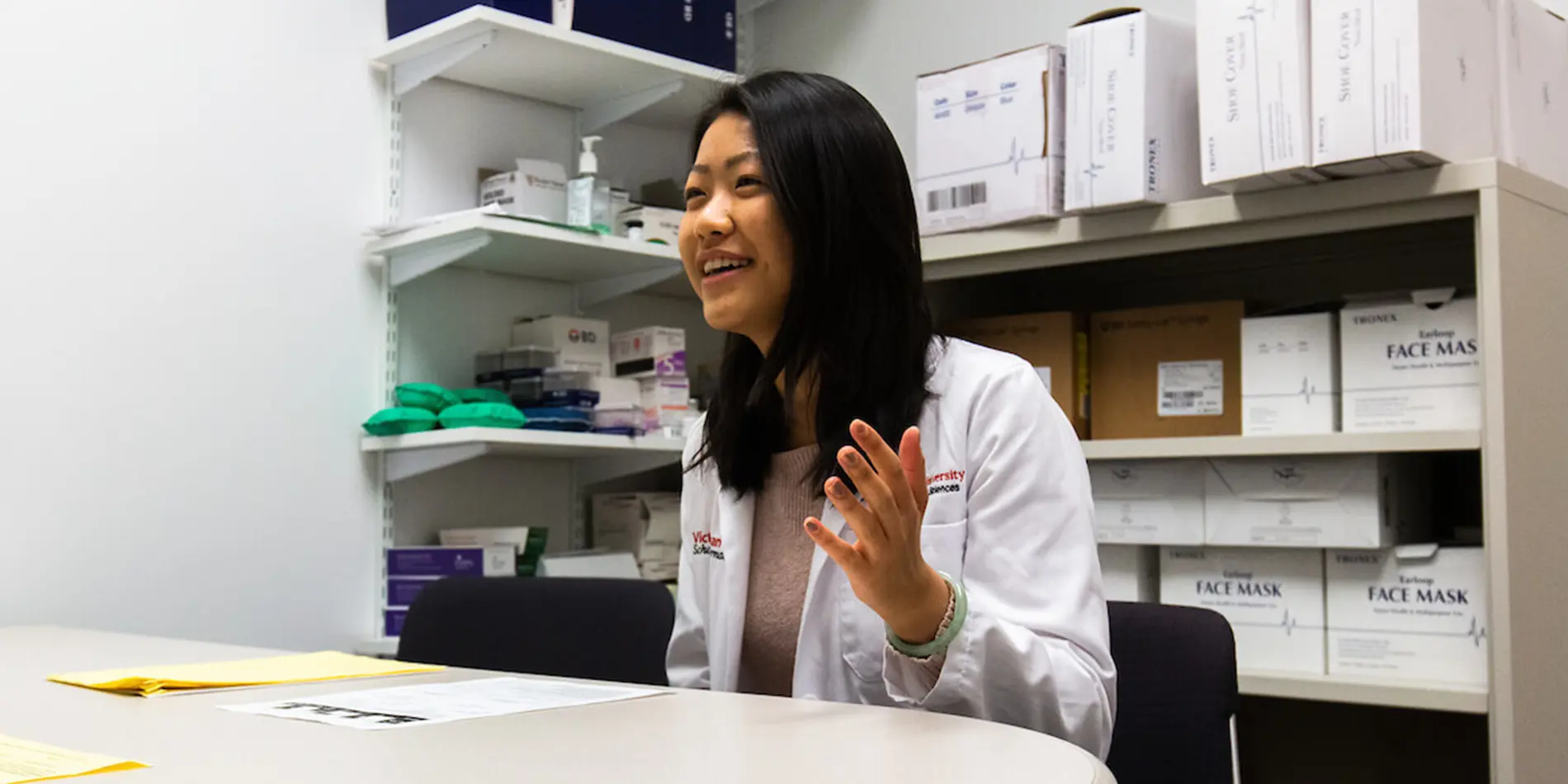Are you thinking about becoming a pharmacist? It’s a vital profession that offers many career paths, but you must first determine if this field is right for you.
Keep reading to learn five essential questions you should ask yourself before pursuing a pharmacy career and how Northeastern’s Bouvé College of Health Sciences can help you get started.

Career Guide
Learn how a PharmD can give you the skills for success in the industry.

What Is a Pharmacist?
A pharmacist is a healthcare professional specifically trained to be a medication expert. They play an essential role in educating patients about administering their medications, treatment effects, and potential medication interactions.
Pharmacists generally collaborate with a wide range of healthcare providers to ensure patients receive correct treatments and dosages. Many work in community pharmacies, such as independent pharmacies or large corporations (i.e., CVS or Walgreens), but pharmacists are also employed in specialty roles in hospitals, veterinary pharmacies, government organizations, and more.
A pharmacist may also be responsible for administering various vaccinations, overseeing pharmacy interns and technicians, and basic record-keeping and administrative tasks, depending on where they work.
Anywhere that a patient may need medication, a pharmacist is included on the team to ensure patients receive the correct medication, for the right medical condition, at the correct dose, and without interactions with their other medications or medical conditions. The pharmacist is a critical member for the safe and effective use of medications with patients, and they are a key member in helping patients get access to affordable treatments.
5 Questions to Ask Before Becoming a Pharmacist
1. Do you want to make a difference in patients’ lives?
No matter where you work in the pharmacy field, your job will ultimately impact patients’ lives. Optimizing medications is a critical way to improve a patient’s quality of life. If you hope to have a career where your day-to-day work makes a difference, pharmacy may be right for you.
2. Are you willing to pursue the educational requirements?
Becoming a pharmacist requires a significant time investment. To practice in the field, you must meet stringent educational requirements. To become a pharmacist, you must:
- Obtain a PharmD degree. To start, you must have at least a high school diploma or have already completed an undergraduate degree. From there, you have multiple options available for you to complete your doctorate in four to six years.
- Fulfill additional training requirements. Once you have obtained your PharmD degree, you must pass two additional exams: the NAPLEX and a state-specific law exam. Once you complete these and any other training requirements, such as internships and fieldwork, you can obtain your license and begin applying for jobs.
- You should expect to continue taking education courses throughout your career to keep up with advances in pharmacological science.
3. How will you pay for school?
When considering a career as a pharmacist, it’s essential to consider how you will finance the required education. Northeastern offers graduate students a variety of resources to help pay for school, including assistantships, scholarships, grants, loans, and work awards. Students should also consider starting their Free Application for Federal Student Aid (FAFSA), the first step toward receiving financial support from the federal government.
4. Do you prefer patient interaction or research and discovery?
If you would prefer research-based work in a laboratory setting, a career in pharmaceutical science may be better for you. Pharmaceutical scientists are involved in research, drug discovery, and drug testing and are typically employed by pharmaceutical and biotechnology companies.
5. Do you possess exceptional attention to detail?
Attention to detail is critical in pharmacy. Pharmacists must make sure the prescriptions they fill are precise and accurate, as the slightest mistake could harm a patient. Pharmacists must develop other vital skills, including analytical skills, communication skills, computer skills, and managerial skills.
3 Benefits of Pursuing a PharmD Degree
To become a pharmacist, you must obtain a Doctor of Pharmacy (PharmD) degree. Attaining the title requires significant time and effort. Here are three reasons a pharmacy career is worth the investment.
1. Plentiful Career Options
There are many career paths pharmacists can choose:
- Community pharmacists work in retail pharmacies and prepare and dispense prescriptions as directed by the customer’s physician.
- Clinical pharmacists are typically employed in healthcare settings, such as hospitals, clinics, emergency departments, or rehabilitation centers, and work collaboratively with a healthcare provider to treat patients.
- Institutional pharmacists, like clinical pharmacists, work in healthcare institutions; however, these pharmacists focus on verifying and approving prescriptions rather than direct patient care.
- Consultant pharmacists provide consulting services to various partners, such as hospitals, clinics, insurance providers, or pharmaceutical companies.
- Pharmaceutical industry pharmacists use their pharmaceutical science expertise for business purposes, such as helping to design clinical trials, establishing safety regulations, or aiding sales and marketing efforts.
Aside from the traditional roles, a PharmD degree can also prepare you for various alternative career paths.
- Veterinary pharmacists perform the same duties as clinical and community pharmacists but treat animals rather than people.
- Geriatric pharmacists specialize in working with older patient populations.
- Public health roles are available to pharmacists, who may help establish vaccine drives in at-risk communities, advise local, state, and federal public health authorities, and more.
- Legal pathways are available to those with a PharmD. Individuals in these roles specialize in pharmaceutical law and regulations, allowing them to advise doctors, hospitals, and other institutions on legal issues that may threaten their business.
Whether you pursue a career path as a pharmacist or a pharmaceutical scientist, a PharmD degree can put you on track to landing a role in either occupation. Northeastern also offers dual programs that allow you to pursue, for example, a business degree and a PharmD together.
2. A Competitive Salary
Most pharmacists earn six-figure incomes, with an average annual salary of approximately $128,000. According to the U.S. Bureau of Labor Statistics, the top paid settings for licensed pharmacists are:
- Ambulatory healthcare services: $137,820
- Hospitals: $131,290
- Food and beverage stores: $131,200
- Pharmacies and drug stores: $125,740
3. Work-life Balance
While some pharmacists work nights, weekends, or holidays, the majority enjoy full-time positions with an excellent work-life balance compared to doctors and other medical professionals.
If this sounds like the right career for you, we’re here to help you get started. Northeastern’s Bouvé School of Pharmacy and Pharmaceutical Sciences offers an accredited PharmD program that gives you the personal attention of a small program, backed by the resources of a large university. The program offers early assurance, transfer, and direct entry for whatever stage you are at in your journey.
Download Our Free Guide to Advancing Your Pharmacy Career

Career Guide
Learn how a PharmD can give you the skills for success in the industry.





